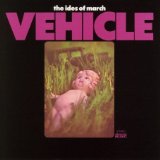By the most common definition of the term, The Ides of March were a one hit wonder band. Forty years ago this week their song “Vehicle” broke onto the Billboard charts, where it would peak at number two in late May 1970. Never again would the band hit the top 40.
 A popular Chicago-area group, the band actually reached 42 on the Billboard charts in 1966 with a song released on a local label. Two years later the band added a horn section. When Warner Brothers signed the band, “Vehicle,” forgive the pun, was a perfect vehicle for the times. Horn bands were hot. After all, Chicago and Blood, Sweat & Tears both had hit LPs and singles in the late 1960s. Built around the opening horn hook and driven by the lead guitar, “Vehicle” was cut from much the same mold.
A popular Chicago-area group, the band actually reached 42 on the Billboard charts in 1966 with a song released on a local label. Two years later the band added a horn section. When Warner Brothers signed the band, “Vehicle,” forgive the pun, was a perfect vehicle for the times. Horn bands were hot. After all, Chicago and Blood, Sweat & Tears both had hit LPs and singles in the late 1960s. Built around the opening horn hook and driven by the lead guitar, “Vehicle” was cut from much the same mold.
As was not uncommon, the song, written and sung by guitarist Jim Peterik, was released before the album of the same name. Although the album still featured the horn section, it also seems to show a band perhaps still in search of an identity. Both “Home” and “One Woman Man” were in the tradition of standard pop ballads while “Factory Band” echoed the current popularity of Creedence Clearwater Revival (whose Cosmos Factory LP would be released that summer). With that, Vehicle, the album, might be noteworthy only for the top 10 hit that gave it its name. But two cover songs display an exploratory, progressive element that made the LP of more than passing interest.
Side 1 of the album closed with a seven-minute version of “Wooden Ships,” released the prior year on Crosby, Stills & Nash. The Ides of March don’t ignore the original flavor of the song. Yet with a percussive introduction and making the horns prominent, “Wooden Ships/Dharma for One” creates a blend resulting in a more forceful rendition than the original and most subsequent cover versions.
The band does the same in closing the album with the Beatles’ “Eleanor Rigby.” Calling it “Symphony for Eleanor,” the nearly ten-minute work bears little resemblance to the original other than springing from the structure of the original melody and using the original lyrics. The middle section of the song is an extended exploration of the tune with both pop-like and more progressive and hard rock approaches. It is perhaps the best display of the chops in the band and certainly both it and “Wooden Ships” are more indicative of the talent in the group than the single-length tunes on the LP.
The Ides of March would release an album each of the next three years but only two songs, both from the band’s second Warner Brothers album, would reach the charts and then only at 64 and 73. In fact, by 1972 the band had abandoned the horn band concept and soon disappeared from view. Peterik would go on to found the band Survivor and pen its top hit, “Eye of the Tiger,” and collaborate on several other hits for bands like .38 Special. Although CD technology and nostalgia would lead to the re-release of much of their music and the band would resuming touring in the 2000s, like most one hit wonders, “Vehicle” was a product of its time. Undoubtedly, the same is true of the progressive elements on the LP but they elevate the album and the band beyond simply one hit wonder dimensions.
Hey, well I’m the friendly stranger in the black sedan
Won’t you hop inside my car?
The Ides of March, “Vehicle”







